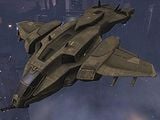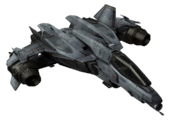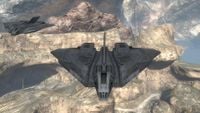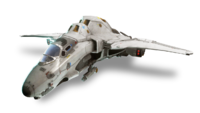UNSC Air Force
From Halopedia, the Halo wiki
| UNSC Air Force | |
|---|---|
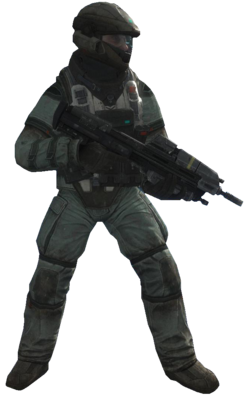 An Air Force pilot in 2552 An Air Force pilot in 2552
| |
|
Formed: |
Likely around 2160s |
|
Affiliation: |
|
|
Branch: |
|
|
Role: |
Aerial support and defensive force |
|
Engagements: |
|
|
Commanders: |
|
The UNSC Air Force is a branch of the UNSC Armed Forces along with the UNSC Army, Navy, Marine Corps, and Spartans. A component of the UNSC Defense Forces (UNSCDF) along with the Army, the Air Force serves as an aerial defense and support force.[1] It is tasked with organizing aerial operations, conducting tactical strikes and bombing runs, providing close-air-support for infantry forces, and transportation of UNSC personnel.[2]
History
The human Outer Colony of Meridian was home to an impressive UNSC Air Force garrison. When the colony was attacked by the Covenant in 2548, the Air Force aided in Meridian's defense, leading to an extended battle lasting three years.[3] The Air Force was present during the Fall of Reach, where their D77-TC Pelican dropships and UH-144 Falcons provided transport and close air support to Army and Marine forces. Additionally, Air Force Longsword interceptors provided air support for ground forces, and YSS-1000 Sabre fighters had a significant role in Operation: UPPER CUT.[2][note 1]
In February 2558, the Air Force was involved in the Requiem Campaign alongside other UNSC forces.[4]
Organization
The Air Force is subordinate to the UNSC High Command (HIGHCOM). Like the UNSC Army and Marine Corps, the Air Force is organized under the Unified Ground Command.[5] Within the Air Force are a number of major commands tasked with different administrative and operational roles. Among these are the Air Combat Command, which is tasked with gaining air superiority and providing support for ground forces, and the Air Mobility Command, which contains Air Mobility Express, assigned to airlift materiél and personnel during wartime.[2][6] The Air Force also contains security forces which are responsible for airbase and spaceport defense.[7]
Personnel
Large numbers of airmen serve in the UNSC Air Force. Rank is divided between officers and enlisted. For a list of ranks within the Air Force, see UNSC rank structure.
UNSC Air Force personnel wear distinctive uniforms. Pilots wear fatigues with teal-toned camouflage and white chest armor. The suit lacks the additional knee, shin or shoulder armor plating worn by most Army troopers or Marines. On missions in a vacuum, the suit can be sealed off and an enclosed standard combat helmet is worn with it.[2] Additionally, the air force operates its own pilot helmet, which is compatible with all other UNSC armor systems.[8] This helmet is presumably used in normal missions while the combat helmet is worn on operations where direct combat, such as boarding action, is expected.
Equipment
Infantry weapons
The UNSC Air Force maintains an inventory of small arms and other infantry weapons, and appears to share some resources with the UNSC Army. The Air Forces uses the MA37 Individual Combat Weapon System as the standard assault weapon. The M392 DMR was used for medium-range suppression before being replaced by the heavier M395 DMR.[9] In addition, the M6 series is the standard personal sidearm of the Air Force. During the Fall of Reach, the M6G magnum was used by Air Force personnel, while the M6H magnum is the standard personal sidearm as of 2555.[10] The M45 shotgun is used by personnel for close-quarters combat.
Snipers operate with the SRS99-AM sniper rifle for long-range suppression and anti-matériel operations. The M319 grenade launcher is used for medium-range suppression and anti-fortification duties. The Air Force also operates the M9 High-Explosive Dual-Purpose Grenade. Anti-armor fire is provided by the M41 rocket launcher.[2]
Vehicles
The UNSC Air Force operates several vehicles for Security, including the M290 Mongoose and the M290-M Gungoose, specifically the Urban variant.[11]
Aircraft
The UNSC Air Force operates a wide variety of aircraft. The D77-TC Pelican is used mainly for the pickup and transportation of personnel, vehicles and equipment, but is a multirole aerodyne which is capable of carrying numerous armament configurations, including Scorpion anti-tank missiles, Anvil II air-to-surface missiles, as well as a chin-mounted 20mm autocannon.
The UH-144 Falcon is a lighter troop transport and support aircraft which, in addition to a heavy nose cannon, can also be outfitted with grenade launchers or machine guns as secondary armament.[12] It is primarily used to transport small numbers of troops to where the larger Pelican cannot.
The UNSC Air Force also operates a number of space fighters, the most common of which is the GA-TL1 Longsword.[13] The Longsword is a multi-role fighter that can be used in a variety of missions, including ground support, anti-ship attacks, and combat with other fighters.[14][15] The Air Force also maintains the YSS-1000 Sabre as a space superiority fighter. This prototype aircraft possesses powerful energy shielding technology, and is designed for the dual purposes of peak acceleration and maneuverability in orbital combat.[2] In addition to the Sabre, the Air Force also fielded the F-41 Broadsword throughout the Human-Covenant War and the post-war conflicts. Following the Human-Covenant War, the remaining B-65 Shortswords were transferred from the UNSC Navy to the Air Force as reserve units.[13]
Behind the scenes
Initially, author Eric Nylund expressed the opinion that its role and function would have been absorbed into the UNSC Navy, though denied that this was canon.[16] Later, in an interview, Frank O'Connor confirmed the existence of an Air Force as a branch of the UNSC, specifically the UNSC-DF along with the UNSC Army.[1]
Gallery
- Pilot hul-3.jpg
The Air Force's pilot helmet.
The YSS-1000 Sabre, an experimental Air Force starfighter.
An atmospheric variant of the GA-TL1 Longsword, the UNSC's primary combat fighter.
The F-41 Broadsword, the UNSC's postwar space superiority fighter.
List of appearances
- Halo: Reach (First appearance)
- Halo: Combat Evolved Anniversary (Mentioned only)
- Halo 4
- Halo: Escalation
- Halo: Mortal Dictata (Mentioned only)
- Halo: Fleet Battles (Mentioned only)
- Halo 5: Guardians (Mentioned only)
Notes
- ^ Sabre pilots encountered in the level Long Night of Solace wear outfits identical to those worn by the Air Force Falcon pilots in Tip of the Spear, implying they are part of the same branch.
Sources
- ^ a b Halo Story Page: Interview with Frank O'Connor and Robert McLees
- ^ a b c d e f Halo: Reach, campaign levels Tip of the Spear, Long Night of Solace
- ^ Halo Waypoint: Meridian
- ^ Spartan Ops, S1E5 Memento Mori
- ^ Waypoint: Catalog Interaction page 14
- ^ "The Free Dictionary" article on 'AMX'
- ^ Halo Waypoint: Jordan Gaines
- ^ Halo: Reach, Armory
- ^ Halo Waypoint: DMR
- ^ Halo Waypoint: Magnum
- ^ Halo 5: Guardians, Urban Mongoose REQ card
- ^ Halo Waypoint: UH-144 Falcon
- ^ a b Halo Waypoint: The Halo Bulletin: 9.24.14
- ^ Halo: The Essential Visual Guide, page 112
- ^ Halo: Reach
- ^ Halopedia:Letter - Re:UNSC Army
